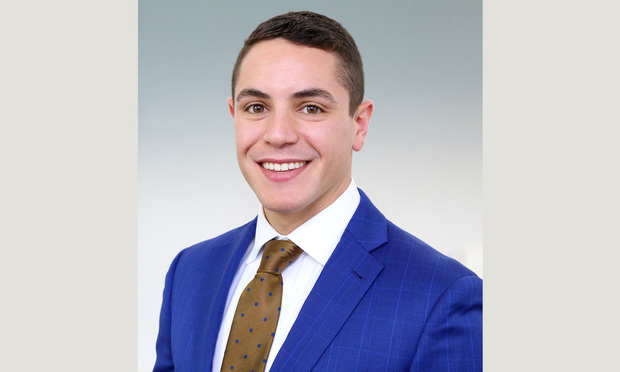 Zachary Kimmel of Clark Hill.
Zachary Kimmel of Clark Hill.For many young lawyers, law school and its memories are still fresh. While it takes time to develop professional skills, build a client base, and provide substantive value as legal professionals, young lawyers should focus at least some of their time on connecting with both law students and law schools in imparting the knowledge they have recently gained in order to build relationships with their soon-to-be colleagues. There are a many ways to connect, give back, and benefit from these relationships, but a few easy wins include helping with mock interviews, mentoring, and presenting at law schools.
Mock Interviews
For many law students, the mere idea of interviewing with a potential employer is enough to bring on intense anxiety. Understandably, the interview process represents one of those make- or-break events where a student is tasked with both articulating their scholastic achievements and showing that they are a good fit with the firm’s culture. Given the stakes and the relatively minimal time allotted to the interview, young lawyers can help students through this process. One of the best ways a young lawyer can help is to volunteer their time by participating in mock interviews. These interviews, generally coordinated through the law school’s career services office, take place at the young lawyer’s firm where interview conditions are simulated to provide students with the opportunity to answer common questions and receive instant feedback. Additionally, mock interview programs benefit the young lawyers as they are presented with the chance to give back to their local legal community early on, engage with the legal institutions at a grassroots level, and build relationships with the next crop of lawyers who will soon ascend to colleague status.
Mentoring in a Casual Setting
Prior to completing law school and passing the bar, it is likely that a young lawyer remembers being a student and meeting with someone in the profession for coffee. During these meetings, students tend to pepper seasoned practitioners with questions about their specific work and advice for breaking into a practice area. While experienced practitioners provide valuable insight with respect to a long-term success plans, a young lawyer can supplement that knowledge with experiences and practices unique to their relative newness to the profession. For example, a student might ask a young lawyer questions about how to standout in a summer associate program, what networking opportunities should be taken advantage of during law school, and how to acclimate to firm work-life balance upon graduation. In a profession that is ever-changing, a young lawyer can speak more readily to the instant challenges they felt upon entering the profession and provide guidance on how to position oneself in succeeding. These causal meetings give a young lawyer the opportunity to be a mentor and immediately give back to the local legal community with recently lived experiences. This experience provides a meaningful forum in forging future professional relationships.
Law School Presentations
For young lawyers, it can be a challenge to find speaking opportunities due to general lack of experience. However, law schools are almost always looking for practical programming to offer students during the lunch hour. Young lawyers can identify this need and volunteer to present a topic related to early practice at the law school. For example, a young lawyer could draft a presentation explaining the definition of a billable-hour, which is something all young lawyers should be able to talk about confidently, yet something that most law students know nothing about. In this instance, both the law school and the students benefit from substance of the programming, and the young lawyer gains experience in facilitating and public speaking. Further, as a young lawyer progresses in their career, the goodwill developed at the law school early on has the potential to snowball into more substantive presentations and exposure to the institution’s partners.
As a young lawyer, the relative lack in skills and experience should not limit the opportunities for engagement and giving back to the legal community. Whether it is participating in a mock interview, sitting down for a cup of coffee, or presenting at a nearby law school, law students, institutions, and other young lawyers all seek to benefit from whatever experience can be provided. The legal profession is predicated in large part on its community., and young lawyers should engage early on by giving back to that community which will benefit the young lawyer professionally in the future.
Zachary M. Kimmel is an associate with the labor and employment practice group in Clark Hill’s Philadelphia office. He partners with both private and public sector employers in handling disputes, ensuring statutory compliance and consulting with clients on best practices in the work place.
"later" - Google News
May 28, 2020 at 12:37AM
https://ift.tt/2X8vI31
Young Lawyers: Engage the Legal Community Now, Benefit Professionally Later | The Legal Intelligencer - Law.com
"later" - Google News
https://ift.tt/2KR2wq4
Bagikan Berita Ini














0 Response to "Young Lawyers: Engage the Legal Community Now, Benefit Professionally Later | The Legal Intelligencer - Law.com"
Post a Comment